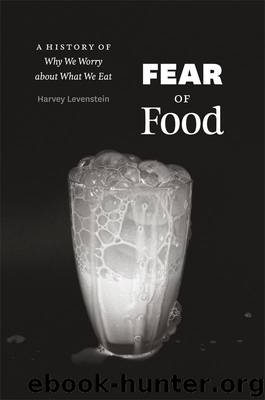Fear of Food: A History of Why We Worry About What We Eat by Levenstein Harvey

Author:Levenstein, Harvey
Language: eng
Format: epub
Publisher: The University of Chicago Press
Rodales and Radicals
In the late 1960s, this kind of neo-Romantic elevation of nature and folk wisdom over science and reason appealed mightily to young people swept up in the so-called counterculture. Soon long-haired people wearing beads and sandals were opening stores selling “natural foods” in practically every city and college town in the nation. The idea of avoiding foods processed by large companies also appealed to the political rebels of the New Left, who blamed giant corporations, and the scientists working for them, for the disastrous Vietnam War and most of the other things wrong with America. Although J. I. Rodale himself felt little affinity for “hippies” and the New Left, people in both groups found support for their views in the Rodale publications. Under his son, Robert, who gradually took over editorial direction of the company in the 1960s, the magazines regularly denounced large food processors, corporate farming, and conventional science and medicine while extolling the superior health of the darker-skinned poor people of the world who did not eat processed foods. Although at times they did give scientific-sounding explanations for the superiority of unprocessed foods, these usually reflected J. I. Rodale’s vitamania, which emphasized that modern farming and processing deprived foods of their vitamins and minerals.30 (The elder Rodale credited his being able to stand up to the “clobbering and insulting” of the early years to “plenty of vitamin B, the nerve vitamin,” and said he took seventy vitamin and mineral supplements a day “as protection against pollution” and to restore vitamins lost in cooking.)31
At the same time, though, mainstream scientists began providing scientific backing to the Rodales’ critiques. Rachel Carson’s Silent Spring in particular led to a number of scientific studies warning of dangerous levels of mercury in freshwater fish and DDT residues in milk, fish, and other foods. By 1969 almost 60 percent of Americans surveyed said they thought that agricultural chemicals posed a danger to their health, even if used carefully.32 Partly as a result, subscriptions to Organic Gardening and Farming jumped 40 percent, to 700,000, from 1970 to 1971.33
Meanwhile, young radicals were doing scientific research that supported other Rodale criticisms of the food supply. A number of them were recruited by the consumer advocate Ralph Nader, who in 1968 began denouncing the giant food “oligopolies” for ruining the nation’s health. In 1969 he charged that “the silent violence of their harmful food products” was causing “erosion of the bodily processes, shortening of life, or sudden death.” The culprits, he said, were the large food producers, who cared only about maximizing profits and minimizing costs “no matter what the nutritional, toxic, carcinogenic, or mutagenic impact may be on humans or their progeny.”34 That year 60 percent of Americans surveyed by the government said they thought that much of their food had been “so processed and refined that it had lost its value for health,” and almost 50 percent agreed that the chemicals added to it “take away much of its value for health.”35 The next
Download
This site does not store any files on its server. We only index and link to content provided by other sites. Please contact the content providers to delete copyright contents if any and email us, we'll remove relevant links or contents immediately.
Nutrition for Sport, Exercise, and Health by Spano Marie & Kruskall Laura & Thomas D. Travis(3784)
Nutrition for Sport, Exercise, and Health by Marie Spano & Laura Kruskall & D. Travis Thomas(3734)
The Sprouting Book by Ann Wigmore(3592)
Flavor Flours by Alice Medrich(2865)
Superfood Smoothie Bowls: Delicious, Satisfying, Protein-Packed Blends that Boost Energy and Burn Fat by Chace Daniella(2484)
Memory Rescue by Daniel G. Amen(2424)
Dirty Genes by Ben Lynch(2318)
The Bad Food Bible by Aaron Carroll(2275)
Genius Foods by Max Lugavere(2220)
The Poisoner's Handbook by Deborah Blum(2141)
Good Calories, Bad Calories by Gary Taubes(2112)
The Main Street Vegan Academy Cookbook by Victoria Moran(2089)
The I Quit Sugar Cookbook by Sarah Wilson(2041)
Core Performance Essentials by Mark Verstegen(2014)
Memory Rescue: Supercharge Your Brain, Reverse Memory Loss, and Remember What Matters Most by Amen Dr. Daniel G(1980)
Big Girls Do It Stronger by Jasinda Wilder(1963)
Android App Development by Franceschi Hervé J.;(1845)
Sugar Crush by Dr. Richard Jacoby(1800)
Dr. Colbert's Keto Zone Diet by Don Colbert(1654)
